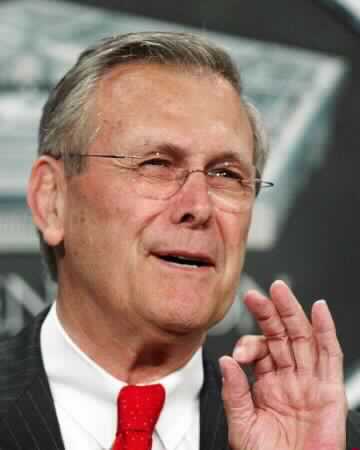HIGHLIGHTS: Ousting Saddam May Require Larger Force than Originally Anticipated, Says Gen. Franks||Genuine Fears Saddam May Use Chemical & Biological Weapons if Cornered||Rumsfeld Denies Iraq Invasion||STORY:
Top US generals are making a concerted drive to convince the White House to postpone or shelf altogether a military campaign to oust Iraqi President Saddam Hussein, The Washington Post said Friday quoting senior Pentagon officials.
In a secret briefing earlier this month for President George W. Bush, Central Command chief General Tommy Franks said that invading Iraq would require a larger force than some military experts have calculated, raised concerns over the use of biological and chemical weapons by Iraq, as well as high possible US casualties.
Partly in response to the Joint Chiefs of Staff, the Bush administration is focusing more on undermining Saddam through covert intelligence operations, two unidentified officials told the daily.
While a final decision rests with Bush, who still appears to have an Iraqi campaign high on his list of priorities, the effort by the Pentagon's military leaders seems to suggest that a war with Iraq may be further away than has been suggested by many US officials.
In meetings this spring, the sources told the daily, the heads of the Army, Navy Air Force and Marine Corps. discussed two specific concerns about an offensive against Iraq.
One was the likelihood Saddam would resort to chemical and biological weapons if he felt cornered. The other was the danger of getting US troops bogged down in a bloody block-by-block urban warfare in Iraq.
Other generals expressed misgivings about toppling Saddam since there appeared to be no evidence of a clear successor who could improve things in his country.
RUMSFELD DENIES IRAQ INVASION
Defense Secretary Donald H. Rumsfeld said there are no plans to invade Iraq or any other country. Within the Bush administration, no decision has been made on how best to deal with the threat the administration sees in Iraqi President Saddam Hussein. Some officials advocate military action, some covert action, others continued diplomatic efforts. (Read photo caption)
On Thursday, President Bush told worried Europeans, who oppose a U.S. move against Iraq, that he has no invasion plan on his desk.
At the same time, Bush made clear his desire to see Saddam's rule ended. He characterized the Iraqi leader a tyrant trying to arm himself with a chemical, biological and nuclear arsenal.
Rumsfeld, saying it would be "dumb" to discuss military planning publicly, refused to discuss the administration's thinking Friday about how to deal with Saddam.
Rumsfeld said, however, that military action would not necessarily require as much buildup as some estimate.
PHOTO CAPTION
U.S. Defense Secretary Donald H. Rumsfeld gestures during his Pentagon briefing Friday, May 24, 2002. Rumsfeld said the U.S. has no plans to invade Iraq or any other country, but he refused to discuss the Bush administration's thinking about how to deal with Iraqi leader Saddam Hussein. (AP Photo/Ron Edmonds
- Author:
& News Agencies - Section:
WORLD HEADLINES


 Home
Home Discover Islam
Discover Islam Quran Recitations
Quran Recitations Lectures
Lectures
 Fatwa
Fatwa Articles
Articles Fiqh
Fiqh E-Books
E-Books Boys & Girls
Boys & Girls  Hajj Rulings
Hajj Rulings Hajj Fatwas
Hajj Fatwas














